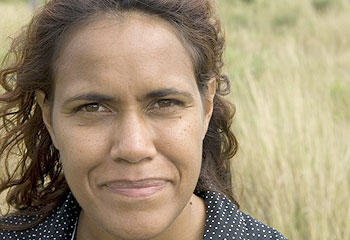 Catherine Astrid Salome "Cathy" Freeman, OAM (born 16 February 1973) at Slade Point, Mackay, Queensland, to Norman Freeman and Cecelia. She and her brothers Gavin, Garth and Norman were raised there and in other parts of Queensland. She also had a sister named Anne-
Catherine Astrid Salome "Cathy" Freeman, OAM (born 16 February 1973) at Slade Point, Mackay, Queensland, to Norman Freeman and Cecelia. She and her brothers Gavin, Garth and Norman were raised there and in other parts of Queensland. She also had a sister named Anne-
She joined with actress Deborah Mailman on a road trip+, a four-
In 2008, Freeman participated in Who Do You Think You Are? and discovered that her mother was of Chinese and English heritage as well as Aboriginal. As a result of a 1917 Queensland policy that Aborigines could serve in the military if they had a European parent, her paternal great grandfather, Frank Fisher served in the 11th Light Horse Regiment during WWI.
On her right arm, the side closest to the spectators on an athletics track, she had the words "Cos I'm Free" tattooed mid-
Freeman began athletics at a very young age. Her first coach was her stepfather, Bruce Barber. By her early teens she had a collection of regional and national titles, having competed in the 100 metres, 200 metres, high jump and long jump. In 1987, Freeman moved on to Kooralbyn International School to be coached professionally by Romanian Mike Danila, who became her first real coach and later a key influence throughout her career; he provided a strict training regime for the young athlete.
In 1988, she was awarded a scholarship to an exclusive girls' school, Fairholme College in Toowoomba. In a competition in 1989, Freeman ran 11.67s in the 100 metres and Danila began to think about entering her in the Commonwealth Games Trials in Sydney.
In 1990, Freeman was chosen as a member of Australia's 4 × 100 m relay team for the 1990 Commonwealth Games in Auckland, New Zealand. The team won the gold medal, making Freeman the first ever Aboriginal Commonwealth Games gold medallist, as well as one of the youngest, at 16 years old. She moved to Melbourne in 1990 after the Auckland Commonwealth Games. Shortly after moving to Melbourne Nic Bideau, her manager, introduced Freeman to athletics coach Peter Fortune, who would become Freeman's coach for the rest of her career. She was then selected to represent Australia at the 1990 World Junior Championships in Athletics in Plovdiv, Bulgaria. There, she reached the semi-
Freeman competed in her second World Junior Championships in Seoul, South Korea. She competed only in the 200 m, winning the silver medal behind China's Hu Ling. Also in 1992 she travelled to her first Olympic Games, reaching the second round of her new specialty event; the 400 metres. At the 1993 World Championships in Athletics Freeman competed in the 200 m, reaching the semi-
1994 was Freeman's breakthrough season, when she entered into the world's elite for the first time. Competing at the 1994 Commonwealth Games in Canada, Freeman won gold in both the 200 m and 400 m. She also competed as a member of Australia's 4x100 m squad, winning the silver medal and as a member of the 4x400 m team, who finished first but were later disqualified. During the 1994 season, Freeman took 1.3 seconds from her 400 m personal best, achieving 50.04 seconds. She also set all-
Freeman made more progress during the 1996 season, setting many personal bests and Australian records. By this stage, she was the biggest challenger to France's Marie-
In 1997, Freeman won the 400 m at the World Championships in Athens, with a time of 49.77 seconds. Her only loss in the 400 m that season was in Oslo where she injured her foot. Freeman took a break for the 1998 season, due to injury. Upon her return to the track in 1999, Freeman did not lose a single 400 m race, including at the World Championships.
 Her winning streak continued into the 2000 season, despite Pérec's return to the track. Freeman was the home favorite for the 400 m title at the 2000 Olympics in Sydney, where she was expected to face-
Her winning streak continued into the 2000 season, despite Pérec's return to the track. Freeman was the home favorite for the 400 m title at the 2000 Olympics in Sydney, where she was expected to face-
Throughout her career, Freeman regularly competed in the Victorian Athletic League where she won two 400 m races at the Stawell Gift Carnival. Freeman did not compete during the 2001 season. In 2002, she returned to the track to compete as a member of Australia's victorious 4x400 m relay team at the 2002 Commonwealth Games. Freeman announced her retirement in 2003.
Since retiring from athletics Freeman has become involved in a range of community and charitable activities. She is an Ambassador of the Australian Indigenous Education Foundation. Freeman was appointed as an Ambassador for Cottage by the Sea, alongside celebrity chef Curtis Stone and big wave surfer Jeff Rowley. Cottage by the Sea is one of Australia's oldest charities and each year provides short-
Cathy Freeman
Athlete